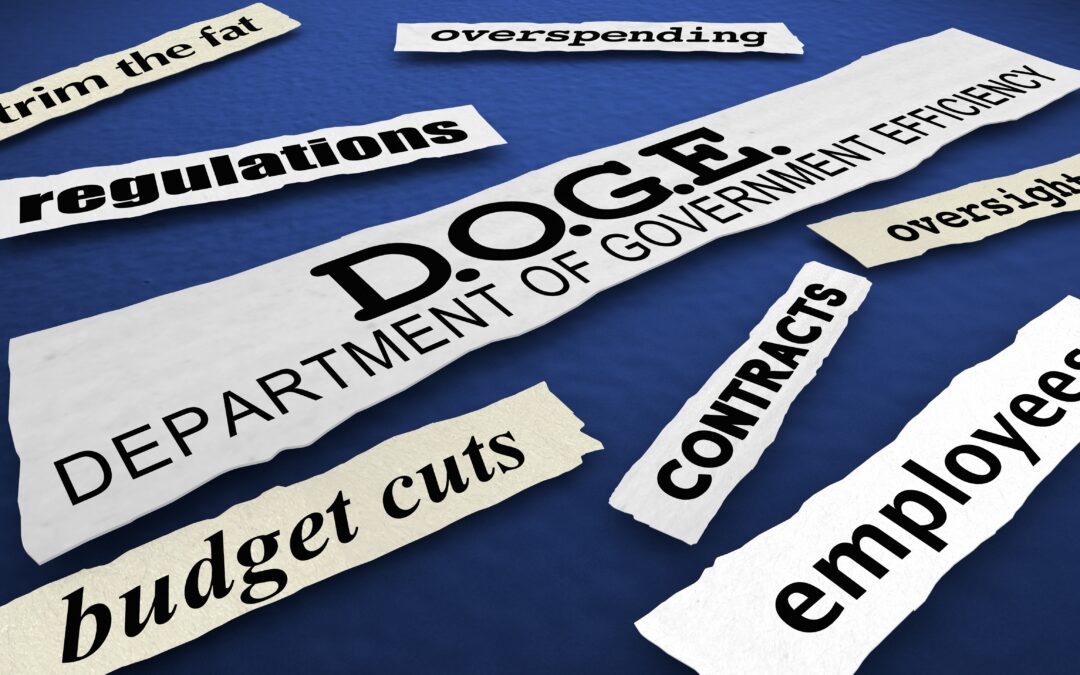Elon Musk’s new Department of Government Efficiency (DOGE) is doing a phenomenal job, exceeding expectations when it comes to optimizing our government’s spending.
But it’s important for investors to be mindful of the real-world impact these cuts will soon have on markets:
Video transcript:
Welcome to Moneyball Economics, I’m Andrew Zatlin.
I’m on the road this week, coming to you from my hotel room and I’m here today to talk about the Department of Government Efficiency or DOGE.
This is a special initiative. It’s being spearheaded by none other than Elon Musk, and it has as its objective, well, they want to cut government spending, wasteful government spending, and they want to somehow find ways to deliver services more efficiently.
This is a promise we’ve heard before. It sounds fantastic, but this time I think they’re actually going to deliver on it, and so that’s what I want to talk about today.
I want to share with you something that I’ve discovered, which tells me that the Musk team is going to be successful at identifying a lot of wasted money, and at the same time, we should talk about what that means downstream because if the government spending is cut, that’s not a Washington DC only situation that’s going to affect me and that’s going to affect you.
So let’s talk about it…
Why do I think Musk is going to be successful where everybody else has failed?
Well, the answer starts with his success at Twitter.
He bought Twitter with 8,000 employees at the time. Within a few months, he fired 80% of those employees, and yet the Twitter service was unaffected. That’s right. He was able to deliver to Twitter services with only 20% of the existing staff.
He wants to replicate that experience with the federal government, and so he has created a team of super geniuses to come in and start looking at federal programs. If it’s that easy, why hasn’t it been done before?
Well, the answer is — because it’s hard.
We’re talking about the federal government. We’re not talking about 8,000 employees. We’re talking about 3 million plus a lot of outside contractors, and we’re not talking about a handful of organizational projects. We’re talking about tens of thousands, if not a hundred thousand or more projects, initiatives, programs and so forth.
And to do this right, to be effective, you want to go bottom up.
You need to review each and every individual and each and every project. That’s impossible for individuals to do. It’s got to be somehow systematic. It’s got to be in some kind of digital automation tool, a database, if you will.
That’s been the eternal problem.
See, it’s not just organizational resistance. The reality is, every agency in the federal government seems to be using different tools. They can’t crosstalk. They’re not sharing a single common database for identifying projects. They don’t even share common taxonomy, meaning an individual project needs to have certain fields to identify it, to track it. They don’t even share that in common. You can’t look at things bottom up by just doing a Google search and saying, show me every project that has diversity in it and then eliminate them.
But I think they’ve been able to accomplish exactly that…
And if they have, that’s the missing link. That is the way they’re going to get through once and for all the stumbling blocks that everybody else has faced in the past.
Why do I think they’ve done it and then how do I think they’ve done it?
Well, I think they’ve done it because recently I think we’re up to 4,000 individual projects and programs that are being terminated, and when I looked at it and trust me folks, I looked at it. Most of them have some version of DEI in the project nomenclature or in the description of what they’re trying to achieve, 4,000. Okay?
They’ve been able to basically say, show me diversity projects. These are axed. You can’t do that at a one-off basis in just a month. You have to have some kind of tool, some kind of database that has pulled this information together from all these agencies and can now identify it.
Remember I said that was the big problem, so how did they get around this?
That’s what I think I’ve discovered. Lemme show you something that came out in December from a guy named Luke Farritor. Luke is one of these two dozen super geniuses that Musk has harnessed to go about this Doge initiative. Luke has an amazing story, amazing accomplishments already for someone of his age, but notice back in December after Trump has been elected, but before he’s president, Luke is already pursuing something:
What he’s asking in this particular snippet, I won’t bother reading it to you. It’s this challenge that he’s trying to face and deal with. He’s saying, look, I’ve got all these different formats of information, PDF, word documents, JSON, you name it, Excel, they’re all different. Is there something out there, a tool that will help me convert all this stuff into a uniform common format that I can then parse?
If you’re coming from the database world, what he is doing is exactly what is needed to create a database of project to say, look, you agency number one are tracking things in an Excel spreadsheet. You’re over here doing it in a doc format. You’re over here doing it in PDF, whatever.
I can now not only grab all of these documents that track your projects and your spending and your participants and your objectives, I can now also parse, I can pull out information and I can search through it.
This is super powerful.
It’s telling me that back in December, Musk was already assembling a team and they were already scoping out the problem and they were already aware that the fundamental practical obstacle to moving forward would be getting the information. What are we spending money on at a granular level? And they were already tackling it.
They were ready in January to hit the ground running and that’s what they’ve been doing. 4,000 projects that I’m aware of have already been terminated. A lot of people, a lot of dollars. Now, if he’s successful, let’s talk about that, not if he’s going to be successful.
That means government spending is going to drop, and this is where I get a little bit concerned. I’m also concerned about the fact that there’s a lot of throwing out the baby with the bathwater movements. I’m sure those will be addressed and corrected. What I’m more concerned with is we’re talking about a lot billions, tens of billions of dollars that won’t get spent by the federal government.
Tens of billions of dollars will get it will move the dial a little bit. I’m concerned that ultimately a lot of these motions that are coming out of Trump will hit the economy.
If you insist that people have to report into work, well, a lot of local gyms and coffee shops who’ve been enjoying that work from home lifestyle, you’re going to see a pullback. And also you’re already going to start to see a pullback just with a threat of layoffs … and not just layoffs, but hiring freezes, project spending freezes.
All of a sudden that anxiety leads a lot of the government workers and contractors who are associated to start pulling back on their spending.
Bottom line, between now and the end of the year, a few hundred thousand government workers and contractors are going to be fired.
That means we are going to see the economy get a hit from hundreds of thousands of people out of work and not spending money and government spending straight up is going to be pulled back. You’re going to see less office equipment purchased, and so you name it, you’re going to see a big hit.
So if spending is going down, that’s a problem.
What do you do about that to keep the economy going along? Well, guess what? Again, Musk and Trump think they’ve got the solution. Bring down government spending, but bring up individual spending by, we’ll just cut everyone a check for $5,000. Sounds good in principle. In reality, it’s just like a revisit of what happened during Covid.
We gave people money and what they do, they bought stuff from China. Same thing’s going to happen this time around. I’m not convinced that you’re going to have two offsetting impulses. That’s a concern for me.
We’ve got more people who are going to be unemployed, less government spending. Let’s face it, when you’re talking trillions of dollars of government spending, 10 billion isn’t the end of the world. Especially if suddenly you get more productivity in the economy, surges even higher. It gets lost in the noise, but it is going to happen now.
This pullback in spending, these layoffs are happening now.
The eventual productivity gains, that’s in the future. That’s what concerns me. I
also see something very interesting on the horizon when we talk further downstream about how the local impact is going to play out.
A lot of people are going to look at the federal gains and say, “wow,” this Doge thing sounds pretty cool? Why aren’t we doing it at the state and city level?
This is a problem for the Democrats because again, most major urban areas are led by Democrats and if you want to pursue cronyism, if you want to pursue wasteful spending, and it’s going to be seen at the city level, and so what you now have handed to the Republicans is a pretty big bully pulpit that they’re going to get up on next year. There’s a midterm election next year.
So you’re going to see the Democrats so far back on their heels trying to recover from all the obvious cronyism that goes into running a city.
I think we’re going to see a big wave of more Republicans getting elected and more Democrats losing elections.
This is a bigger deal than you might imagine, and it’s going to go on for a couple of years economically. We’re already going to start to see the impact over the course of the year. It’s going to get even stronger. The federal government in September gets their new budget, but the local, the state governments, they get their budgets in June and July, and they’re already a little nervous about how much money they can expect to get from the Fed.
There is a general closing of pocketbooks at the government level, and let’s face it, governments spend money … and the private sector does the work. So this is an impact on the private sector. It’s not just money that doesn’t happen and suddenly goes back into taxpayer’s pockets.
I am concerned. I’m getting a little bit more concerned because this is a headwind. I’m going to keep tracking it.
In the meantime, we are in it to win it. Zatlin out.

Andrew Zatlin
Editor, Superforecast Trader & Moneyball Economics





